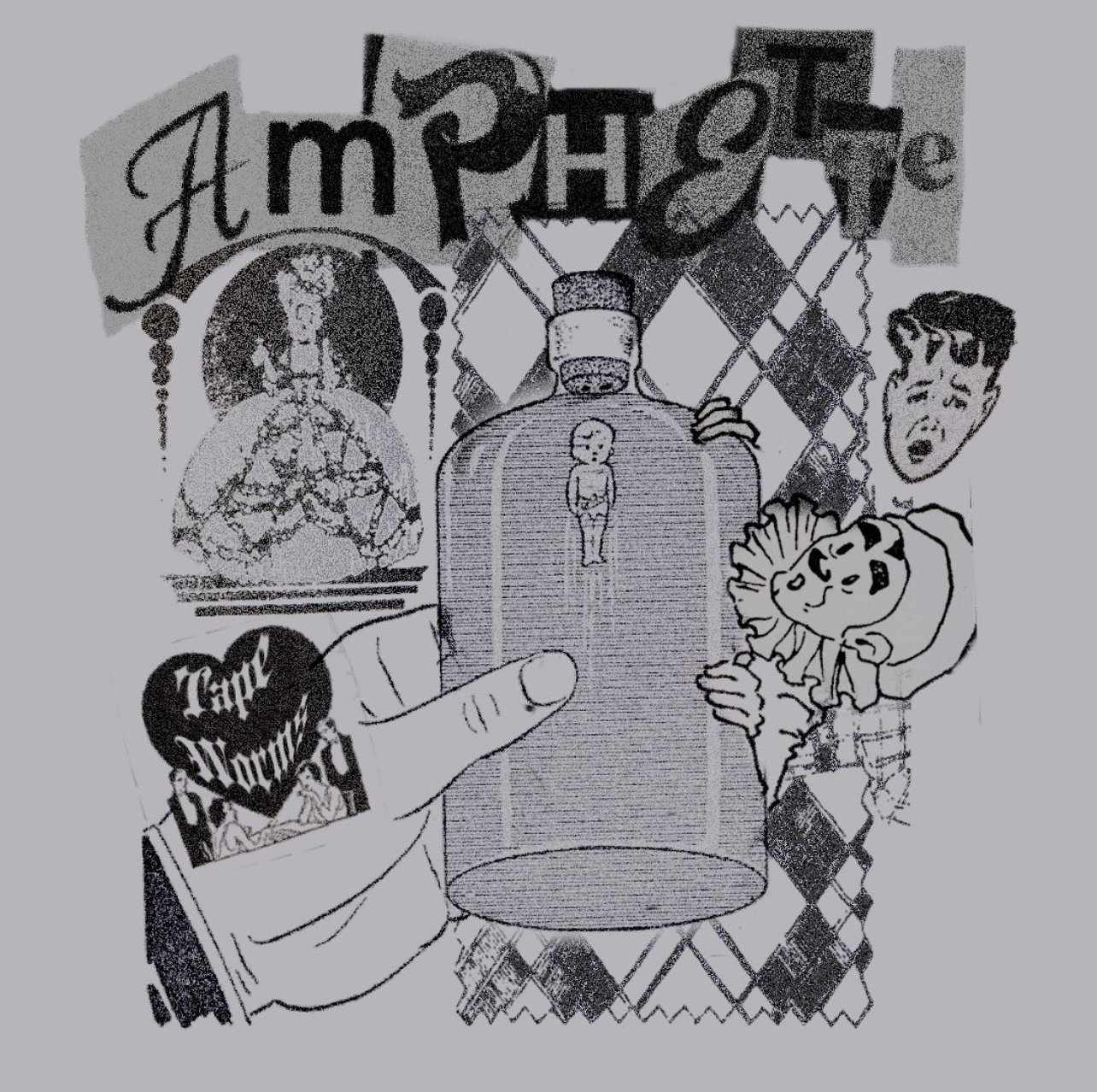Exploring the Innards of Amphette's "Tapeworms"
EP cover art for Amphette’s Tapeworms
Amphette is a Syracuse, NY-based alternative punk band, heavily influenced by movements like Riot Grrrl and nu-metal. While the group originally formed in Syracuse, responding to posters put up around the band’s shared community college, the trio is beginning to move into the Boston house show scene. Their first EP, Tapeworms, was released on March 25.
The group is composed of Piper Markowski (Bassist/Vocalist), Kailyn Leach (Drummer), and Liv Harvey (Guitarist), who is the group’s connection to Emerson. Each member has a hand in writing for the group. Harvey and Markowski write lyrics in a “back-and-forth way. It’s all very collaborative in that aspect,” says Markowski. Harvey writes all her own guitar parts, while Kay writes the drum lines. “I think our lyrical styles really complement each other,” Harvey says. “Piper’s more straightforward, condensed style is a perfect antithesis to my flowery mouthfuls of dense sentences.”
The band refuses to stick to just one thing within their music, experimenting with various alternative genres to craft their sound. The band likes to create “clean vocals with screaming, melodic riffs” alongside “heavier” elements with “angry and sentimental lyrics.” This all comes through on Tapeworms, a culmination of the group’s energy and themes up until this point. All four songs on the EP existed in some capacity before its release, each of them having been performed for live audiences before. Now, however, you don’t have to be lucky enough to catch the band live to hear the songs on Tapeworms.
The EP starts off with a bang, beginning with “MadonnaWhore.” The title references a complex that Sigmund Freud theorized, stemming from the thought that men only have the ability to view women as either saintly Madonnas or whores. The theory says that men will seek relationships with women who they view as perfect and pure, and therefore cannot be sexually attracted to them. The song struggles through this relationship dynamic and how it affects the way that women end up viewing themselves. These complex romantic and personal relationships kickstart a common theme detailed throughout the rest of Tapeworms.
Photo courtesy of @sophsscar
Next up is “Baker-Miller Pink,” named after a shade of pink that is said to reduce violent behavior, although Markowski's vocals are intensely aggressive on the track. Her voice goes high and singsong-y at parts, teasing the song’s subject, contrasting that with her wailing in the chorus of “Tell me how to please you.”
The band’s collective favorite song is “Overexposure,” the third, primarily written by Harvey. The song details power imbalances in relationships and the danger of coerced consent. “It was one of those songs where I woke up one day and was like, ‘OMG I have this riff and chorus idea,’ and recorded it all bare-bones in my voice memos first thing in the morning,” Harvey says. Markowski’s vocal cords are seemingly pushed to their limit in the song, (or so you think until listening to the rest of the album) building to a heavy metal conclusion with the repeated crashing of Leach’s cymbals.
Last on the EP is Markowski’s self-professed baby, “Meatgrinder.” Based on a poem she had been working on for some time, Harvey assisted Markowski in creating a musical adaptation of the work-in-progress. Both this song and “Overexposure” feel particularly cathartic, Markowski explains. “Both songs kinda touch on, like, an acerbic murder fantasy of killing and torturing your abusers. I feel like there’s a lot of discourse on feminine/female rage recently, and these songs really encapsulate that [for me].”
Markowski’s vocals emulate sobbing toward the end of the last track; the sound alone is enough to illustrate the feminist imagery painted with the EP. Tapeworms is one to watch out for in the Boston DIY scene moving forward, proven within the tracks. To listen for yourself, check out their Spotify and follow Amphette on Instagram.

